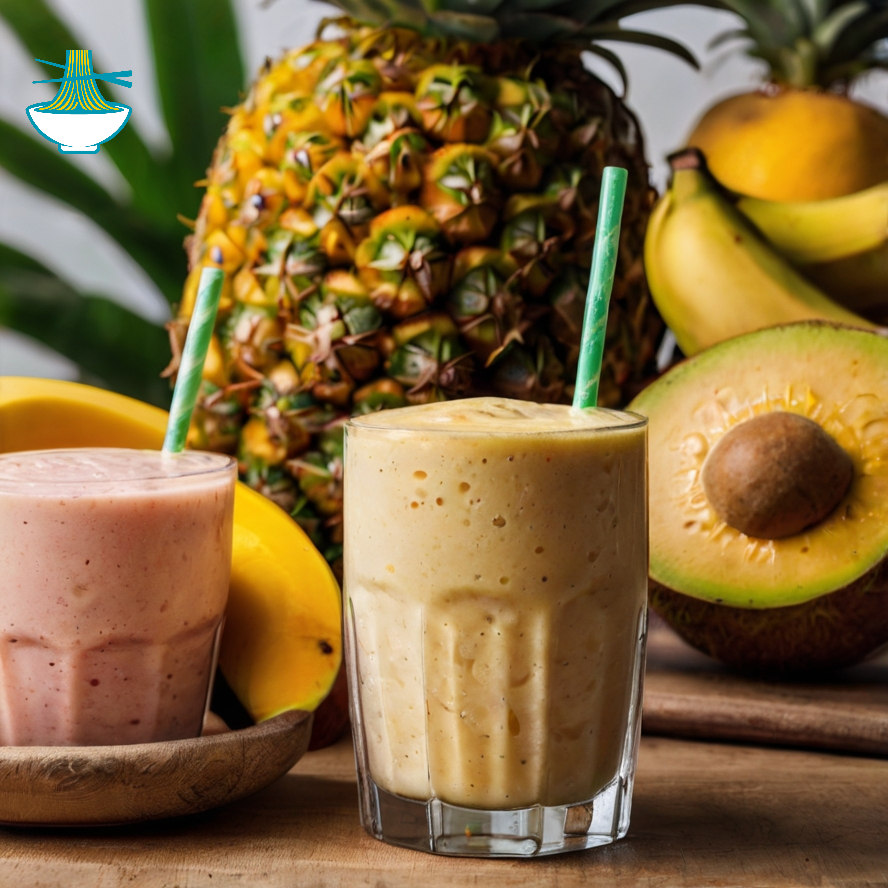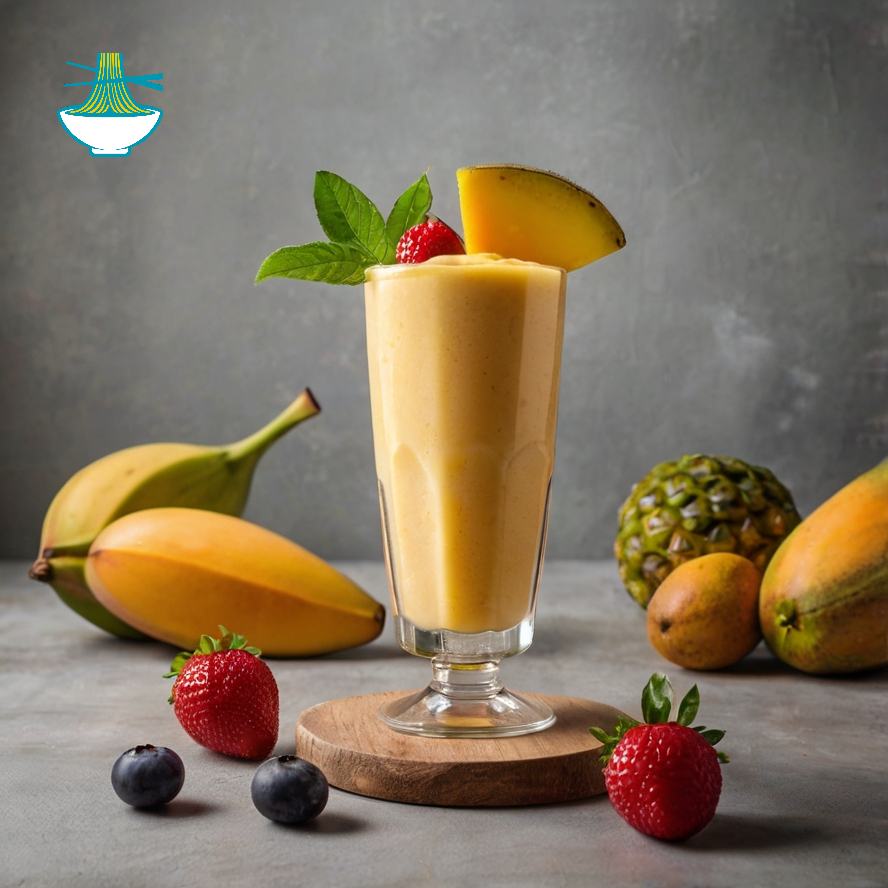Fruit Smoothies are a delicious way to enjoy the natural sweetness and nutritional benefits of tropical fruits like bananas and mangoes. These smoothies are packed with essential vitamins such as vitamin C and potassium, which boost immunity and support heart health. They also provide natural sugars for quick energy and fiber for improved digestion. However, overconsumption of fruit smoothies can lead to excess calorie intake, especially when additional sweeteners are added. Balanced and made fresh, these smoothies are a fantastic way to stay hydrated and energized throughout the day.
Ingredients:
- 1 ripe banana
- 1 cup mango chunks (fresh or frozen)
- ½ cup pineapple chunks (optional)
- 1 cup orange juice or coconut water
- ½ cup Greek yogurt (optional for creaminess)
- Ice cubes (optional)
Instructions:
Prepare the Ingredients
- Start by peeling a ripe banana and slicing it into smaller pieces. The banana will serve as the base for your smoothie, providing a creamy texture and natural sweetness.
Add Mango Chunks
- Cut fresh mango into chunks or use frozen mango chunks for a colder, thicker smoothie. Add about 1 cup of mango to the blender. Mangoes are rich in vitamin C and beta-carotene, contributing to the health benefits of this smoothie.
Include Optional Pineapple Chunks
- If you enjoy the tangy flavor of pineapple, add ½ cup of pineapple chunks. Pineapples contain bromelain, an enzyme that helps with digestion and provides additional sweetness to the smoothie.
Add Liquid Base
- Choose between orange juice or coconut water as your liquid base. Both options offer hydration and a boost of vitamins. Orange juice is packed with vitamin C, while coconut water adds electrolytes and keeps the smoothie refreshing. Pour about 1 cup of your chosen liquid into the blender.
Incorporate Greek Yogurt
- For extra creaminess and a protein boost, add ½ cup of Greek yogurt. If you're looking for a dairy-free option, you can substitute it with a plant-based yogurt, like coconut or almond milk yogurt, to maintain the texture and flavor.
Blend the Mixture
- Secure the lid on your blender and blend the ingredients on high speed until smooth. If the smoothie is too thick, you can adjust the consistency by adding more orange juice or coconut water in small increments. Continue blending until all the ingredients are fully incorporated.
Add Ice for a Chilled Smoothie
- To make your smoothie extra cool and refreshing, add a handful of ice cubes. Blend again for 20-30 seconds, allowing the ice to crush and mix into the smoothie, creating a frosty texture.
Serve and Garnish
- Once your smoothie reaches the desired texture, pour it into a glass. For a final touch, garnish the smoothie with a slice of mango or a sprig of fresh mint. This adds visual appeal and a hint of extra flavor.
Enjoy Immediately
- Your tropical fruit smoothie is now ready to be enjoyed! Serve immediately for the best taste and texture. Perfect as a breakfast, snack, or post-workout refresher.
Plant-Based Alternatives and Supplements:
For those with dietary restrictions or preferences, there are several plant-based alternatives:
- Dairy-Free Yogurt: Substitute Greek yogurt with almond milk yogurt or coconut yogurt for a dairy-free smoothie.
- Nut Milks: Instead of regular milk, almond, cashew, or oat milk can be used to make your smoothie creamier without dairy.
Supplements to Enhance Smoothies:
- Spirulina: A nutrient-rich algae, packed with protein, vitamins, and minerals. It’s especially useful for boosting energy levels and improving immune function.
- Chia Seeds: A great source of fiber, omega-3 fatty acids, and antioxidants. Adding a spoonful of chia seeds can improve digestion, promote heart health, and support weight management.
Creative Ideas for Smoothie Additions:
To elevate the flavor and nutritional value of your smoothie, consider adding:
- Spinach or Kale: For a green boost, add leafy greens. They are packed with iron, calcium, and fiber.
- Flaxseeds: These are rich in omega-3 fatty acids and fiber, promoting heart health and digestion.
- Avocado: It adds creaminess and healthy fats, making your smoothie more satisfying.
Warnings and Tips :
While fruit smoothies can be a healthy addition to your diet, it’s important to consider moderation, especially for certain individuals:
- For Diabetic Individuals: Fruit smoothies, while natural, contain sugars that can affect blood sugar levels. If you're diabetic, it’s essential to monitor your fruit intake. You may opt for smoothies with lower glycemic fruits like berries, avocados, or kiwi and avoid adding sweeteners or high-sugar fruits like pineapples or mangoes.
- For Those Trying to Lose Weight: Although fruit smoothies are packed with nutrients, they can be calorie-dense, especially if additional sweeteners or high-calorie ingredients are added. To avoid weight gain, consider using lower-calorie ingredients like water, coconut water, or unsweetened almond milk and limit sugary fruit additions.
Warnings and Tips for Consuming Fruit Smoothies:
While fruit smoothies can be a healthy addition to your diet, it’s important to consider moderation, especially for certain individuals:
- For Diabetic Individuals: Fruit smoothies, while natural, contain sugars that can affect blood sugar levels. If you're diabetic, it’s essential to monitor your fruit intake. You may opt for smoothies with lower glycemic fruits like berries, avocados, or kiwi and avoid adding sweeteners or high-sugar fruits like pineapples or mangoes.
- For Those Trying to Lose Weight: Although fruit smoothies are packed with nutrients, they can be calorie-dense, especially if additional sweeteners or high-calorie ingredients are added. To avoid weight gain, consider using lower-calorie ingredients like water, coconut water, or unsweetened almond milk and limit sugary fruit additions.
How to Reduce Added Sugars: To make your smoothie healthier, consider these alternatives to added sugars:
- Stevia: A natural, calorie-free sweetener that doesn’t raise blood sugar levels.
- Honey: A natural sweetener, but should be used in moderation.
- Coconut Water: It adds sweetness and is lower in calories than juice.
Frequently Asked Questions (FAQs):
- Can I Add Supplements to My Fruit Smoothie? Yes, adding supplements like spirulina, protein powder, or chia seeds can boost the nutritional value of your smoothie. These are especially beneficial for individuals looking to improve energy levels, support muscle recovery, or enhance overall health.
- What is the Recommended Quantity for Drinking Fruit Smoothies? While there’s no exact rule, it’s best to consume one smoothie per day. Aim for a serving of 8-12 oz (about 250-350 ml) to avoid excess calorie intake. If consumed in excess, especially with high-calorie ingredients, smoothies could contribute to unwanted weight gain.
- Can Fruit Smoothies Affect Blood Sugar Levels? Yes, fruit smoothies can impact blood sugar levels, particularly if made with high-glycemic fruits. If you're diabetic or following a low-sugar diet, opt for lower-sugar fruits like berries or green apples and avoid adding extra sugar or juice.
- What Are the Additional Health Benefits of Drinking Fruit Smoothies Regularly? Regular consumption of fruit smoothies can improve overall health by boosting your immune system, enhancing skin and hair health, providing hydration, and supporting digestion. They are a great way to incorporate more vitamins and minerals into your diet.
- Can These Smoothies Be a Complete Meal? While fruit smoothies can be a nutritious snack or breakfast option, they may not provide all the nutrients needed for a complete meal unless additional protein, healthy fats, and fiber are added. To make them more filling, consider adding nuts, seeds, or protein powder.

Nutritional Values and Benefits
Nutritional values for all ingredients of Tropical Fruit Smoothie and benefits:
1. Banana (1 medium)
- Calories: 105
- Carbohydrates: 27g
- Potassium: 422mg (12% DV)
- Nutritional Benefit: Bananas are a great source of potassium, which helps regulate blood pressure and supports muscle function.
2. Mango Chunks (1 cup)
- Calories: 99
- Carbohydrates: 25g
- Vitamin C: 60mg (67% DV)
- Nutritional Benefit: Mangoes are rich in vitamin C, which boosts immunity, and beta-carotene, which promotes skin and eye health.
3. Pineapple Chunks (½ cup)
- Calories: 41
- Carbohydrates: 11g
- Vitamin C: 39mg (65% DV)
- Nutritional Benefit: Pineapples contain bromelain, an enzyme that aids digestion and reduces inflammation.
4. Orange Juice (1 cup)
- Calories: 112
- Carbohydrates: 26g
- Vitamin C: 124mg (137% DV)
- Nutritional Benefit: Orange juice is an excellent source of vitamin C, which strengthens the immune system and supports skin health.
5. Greek Yogurt (½ cup)
- Calories: 100
- Protein: 10g
- Calcium: 110mg (8% DV)
- Nutritional Benefit: Greek yogurt adds creaminess, protein, and calcium for bone health and muscle repair.
6. Coconut Water (1 cup, alternative to orange juice)
- Calories: 45
- Potassium: 470mg (13% DV)
- Nutritional Benefit: Coconut water is hydrating and provides electrolytes that support muscle recovery and overall hydration.
Merged Nutritional Benefits: Tropical Fruit Smoothies offer a powerful combination of natural sugars, vitamins, and hydration. They are perfect for boosting energy, enhancing immunity, and supporting overall health while satisfying your taste buds with tropical flavors.
Health Benefits :
Beyond hydration and energy, these tropical fruit smoothies offer numerous health benefits:
- Skin Health: Mangoes and oranges are rich in Vitamin C, which helps promote collagen production, keeping your skin firm and glowing. The antioxidants in mangoes and bananas also fight free radicals, reducing signs of aging.
- Hair Health: Bananas and mangoes are rich in vitamins and minerals that help nourish hair follicles. Vitamin C, found abundantly in oranges and mangoes, helps produce collagen, which strengthens hair.
- Improved Sleep: Bananas contain magnesium, which helps relax muscles and nerves, promoting better sleep. Including bananas in your smoothie before bedtime may improve your quality of sleep.


Comments